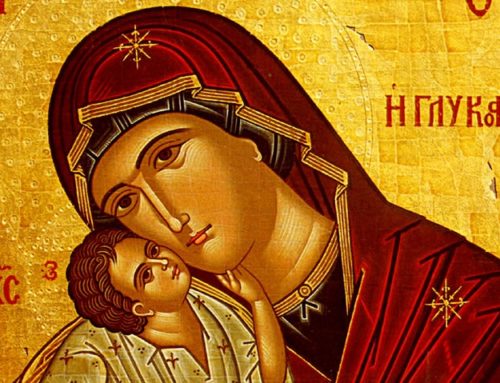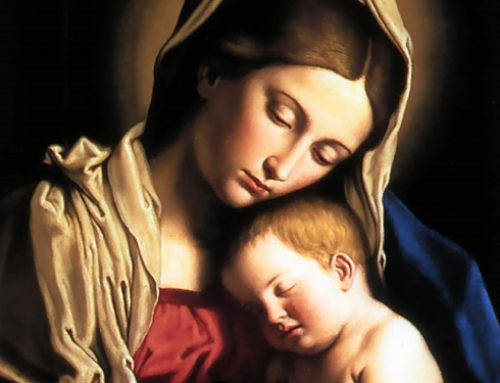Feast of the Annunciation
Words of John Paul II discussing the story of the Annunciation
” In the sixth month the angel Gabriel was sent by God to a town of Galilee called Nazareth, to a virgin betrothed to a man named Joseph, of the house of David , and the virgin’s name was Mary and entering , said: “Hail Mary, full of grace, the Lord is with you . ” She was deeply disturbed by these words and asked herself what this greeting could mean. The angel said, ” Fear not, Mary, for you have found favor with God, you will conceive in the womb and bear a son, and you shall name him Jesus, he will be great and will be called son of the Most High, and the Lord God will give him the throne of David his father ; to reign over the house of Jacob forever and his reign will have no end ” Mary said to the angel,” How shall this be, since I am a virgin?” The angel replied, “The Holy Spirit will come upon you and the power of the Most High will overshadow you; so who is to be born will be holy and will be called Son of God. Behold, Elizabeth, your relative, has also conceived a son in her old age, and this is the sixth month with her who was called barren, for nothing is impossible unto God.” Mary said,” Behold the handmaid of the Lord: be it unto me according to your word “And the angel departed from her.” Luke (Luke 1: 26-38)
The Angel’s Luminous Response
1. The angel offers Mary to be a mother, and unhesitatingly Mary submits her virginity to the purpose. She, believing in the possibility of compliance with the notice, challenges the divine messenger only on the mode of implementation, to correspond better to the will of God, who wants to adhere to with full availability.
“She looked the way , she did not doubt the omnipotence of God ,” says St. Augustine ( Sermo 291).
Moved by her grand love

2. St. Luke does not indicate the precise location where the annunciation of the birth of the Lord takes place; he refers, only, that Mary was in Nazareth an unimportant village which seems predestined to that event.
In addition, the evangelist does not attach particular importance when the angel appears, since no precise historical circumstances are mentioned.
In contact with the heavenly messenger the focus is on the content of his words, which require intense listening to Mary and pure faith.
This consideration allows us to appreciate the greatness of Mary’s faith, especially when compared with the tendency to ask insistently, both yesterday and today, sensible signs to believe.
On the contrary, the acceptance of the divine will of the Virgin is motivated only by her love for God.
Her questions manifest faith
3. Mary is invited to believe in a virgin motherhood, the Old Testament does not recall any precedent.

In fact, the famous oracle of Isaiah: “Behold a virgin shall conceive and bear a son, and shall call his name Emmanuel” (Is 7, 14), but does not exclude this perspective, has been explicitly interpreted in this sense only after the coming of Christ, in the light of the Gospel revelation.
Mary was asked to accept a truth never set out before. She welcomes it simplicity and boldness. With the question “How will this be,” she expresses her faith in the divine power of virginity to reconcile with its unique and exceptional maternity.
Responding (Gabriel), “The Holy Spirit will come upon you and the power of the Most High will overshadow you” (Lk 1: 35), the angel gives the ineffable God’s solution to the question posed by Mary.
Virginity, which seemed an obstacle, turns out to be the particular context in which the Holy Spirit made her conception of the Son of God incarnate. The response of the angel opens the way for the cooperation of the Virgin with the Holy Spirit in Jesus’ generation.
Always faith for the salvation
4. In the fulfillment of the divine plan Mary is given the free collaboration of the human person. Mary, believing in the word of the Lord, complies in fulfilling the announced motherhood.
The Fathers of the Church often emphasize this aspect of the virginal conception of Jesus. Especially Augustine, who commenting on the Gospel of the Annunciation, says: “The angel announces the Virgin listens, believes and conceives” (Sermon 13 in Nat. Dom.). He adds, “The Virgin believes in Christ who announced himself to her, and faith brings him to her bosom; her faith descends from her virginal heart rather than her gut maternal fecundity”(Sermon 293).
The act of faith by Mary reminds us of the faith of Abraham, who at the beginning of the Old Covenant believed God, and thus became the father of numerous descendants (cf. Gen. 15, 6, Redemptoris Mater , 14). At the beginning of the new alliance Mary also with her faith has a decisive influence on the realization of the mystery of the Incarnation and initiates and summarizes the entire redemptive mission of Jesus.
The close relationship between faith and salvation, which Jesus emphasized during his public life ( cf. Mk 5, 34 , 10, 52 , . Etc), also helps us to understand the fundamental role that Mary’s faith has played and continues play in the salvation of mankind.
John Paul II





Leave A Comment
You must be logged in to post a comment.